Evaluation of Sustainability in the Hospitality Industry: A Report
VerifiedAdded on 2022/12/15
|17
|4070
|1
Report
AI Summary
This report critically evaluates the extent to which the hospitality industry contributes to environmental, social, and economic issues. It analyzes the impacts of these issues on the industry's profitability, considering factors such as pollution, social factors, and economic contributions. The report then explains and critically evaluates the importance of corporate sustainability management, focusing on the environmental, social, and economic aspects, and the role of corporate social responsibility. The report also examines the relationship between tourism and the environment, highlighting the importance of sustainability for the long-term success of the industry. The report explores the impact of environmental issues like pollution and climate change, social aspects such as cultural promotion, and economic impacts on job creation and revenue generation. The analysis includes the impacts of environmental factors like pollution, social factors, and economic aspects of the industry, and how they affect profitability and sustainability. The report concludes by emphasizing the need for sustainable practices to ensure the industry's long-term viability.
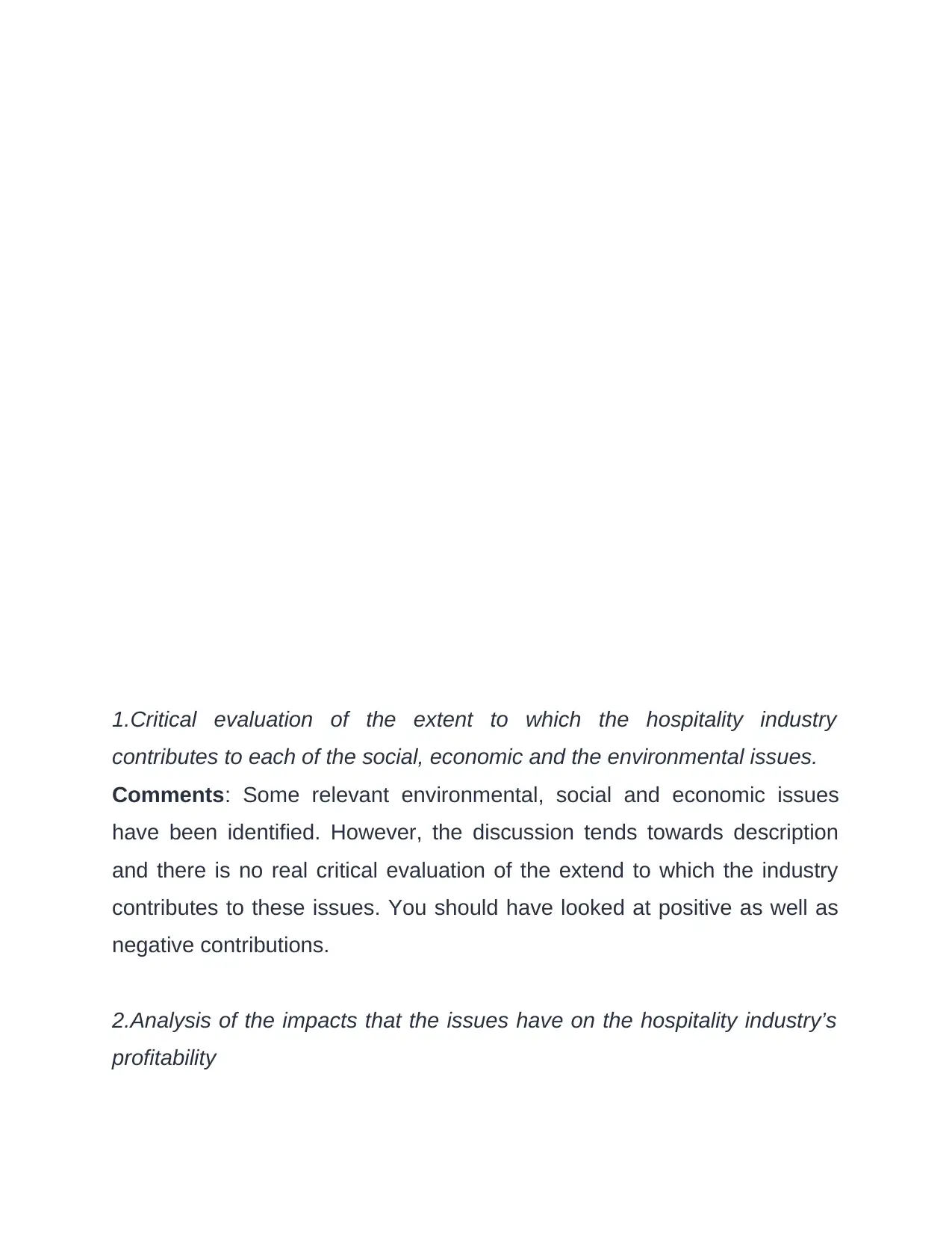
1.Critical evaluation of the extent to which the hospitality industry
contributes to each of the social, economic and the environmental issues.
Comments: Some relevant environmental, social and economic issues
have been identified. However, the discussion tends towards description
and there is no real critical evaluation of the extend to which the industry
contributes to these issues. You should have looked at positive as well as
negative contributions.
2.Analysis of the impacts that the issues have on the hospitality industry’s
profitability
contributes to each of the social, economic and the environmental issues.
Comments: Some relevant environmental, social and economic issues
have been identified. However, the discussion tends towards description
and there is no real critical evaluation of the extend to which the industry
contributes to these issues. You should have looked at positive as well as
negative contributions.
2.Analysis of the impacts that the issues have on the hospitality industry’s
profitability
Paraphrase This Document
Need a fresh take? Get an instant paraphrase of this document with our AI Paraphraser
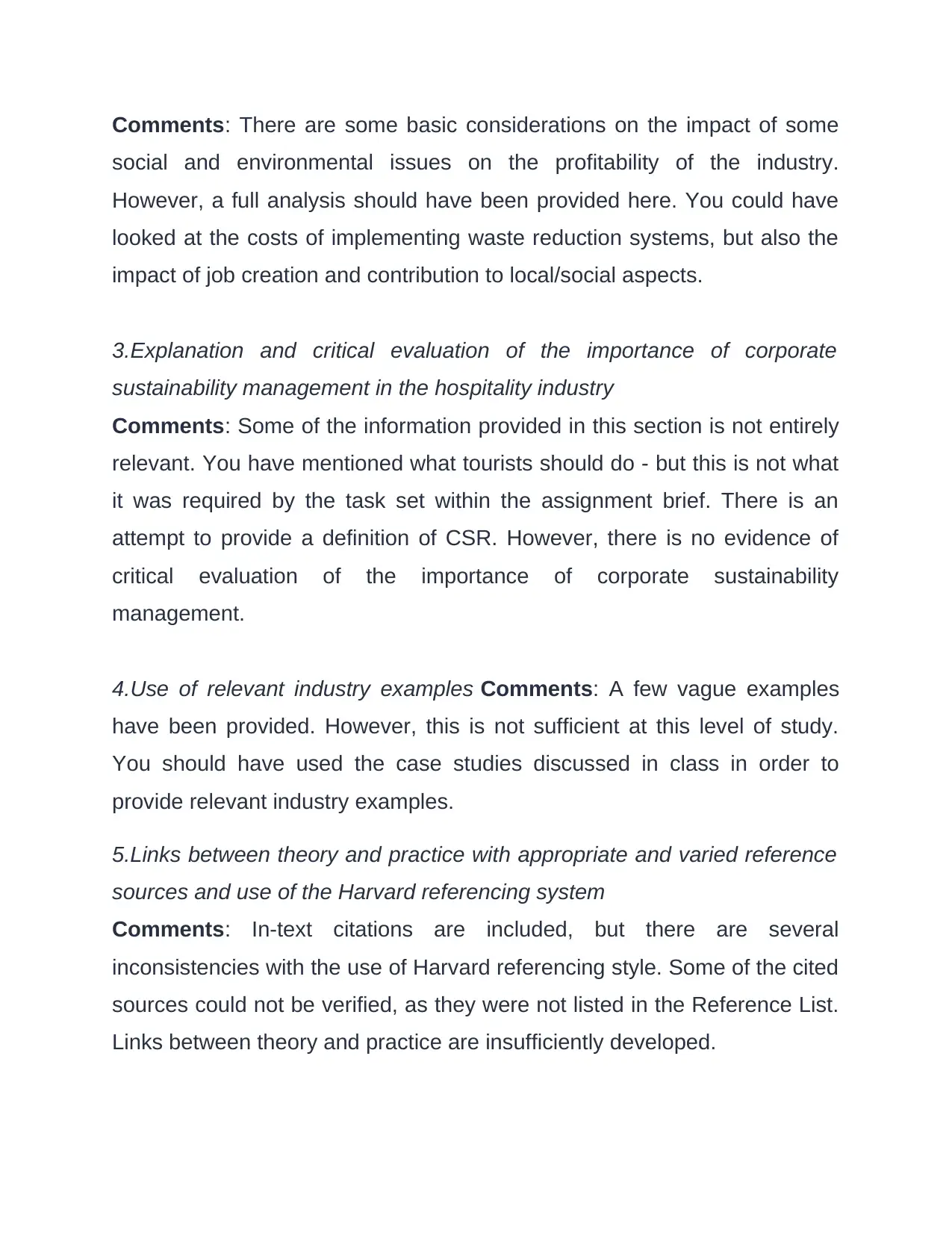
Comments: There are some basic considerations on the impact of some
social and environmental issues on the profitability of the industry.
However, a full analysis should have been provided here. You could have
looked at the costs of implementing waste reduction systems, but also the
impact of job creation and contribution to local/social aspects.
3.Explanation and critical evaluation of the importance of corporate
sustainability management in the hospitality industry
Comments: Some of the information provided in this section is not entirely
relevant. You have mentioned what tourists should do - but this is not what
it was required by the task set within the assignment brief. There is an
attempt to provide a definition of CSR. However, there is no evidence of
critical evaluation of the importance of corporate sustainability
management.
4.Use of relevant industry examples Comments: A few vague examples
have been provided. However, this is not sufficient at this level of study.
You should have used the case studies discussed in class in order to
provide relevant industry examples.
5.Links between theory and practice with appropriate and varied reference
sources and use of the Harvard referencing system
Comments: In-text citations are included, but there are several
inconsistencies with the use of Harvard referencing style. Some of the cited
sources could not be verified, as they were not listed in the Reference List.
Links between theory and practice are insufficiently developed.
social and environmental issues on the profitability of the industry.
However, a full analysis should have been provided here. You could have
looked at the costs of implementing waste reduction systems, but also the
impact of job creation and contribution to local/social aspects.
3.Explanation and critical evaluation of the importance of corporate
sustainability management in the hospitality industry
Comments: Some of the information provided in this section is not entirely
relevant. You have mentioned what tourists should do - but this is not what
it was required by the task set within the assignment brief. There is an
attempt to provide a definition of CSR. However, there is no evidence of
critical evaluation of the importance of corporate sustainability
management.
4.Use of relevant industry examples Comments: A few vague examples
have been provided. However, this is not sufficient at this level of study.
You should have used the case studies discussed in class in order to
provide relevant industry examples.
5.Links between theory and practice with appropriate and varied reference
sources and use of the Harvard referencing system
Comments: In-text citations are included, but there are several
inconsistencies with the use of Harvard referencing style. Some of the cited
sources could not be verified, as they were not listed in the Reference List.
Links between theory and practice are insufficiently developed.

⊘ This is a preview!⊘
Do you want full access?
Subscribe today to unlock all pages.

Trusted by 1+ million students worldwide
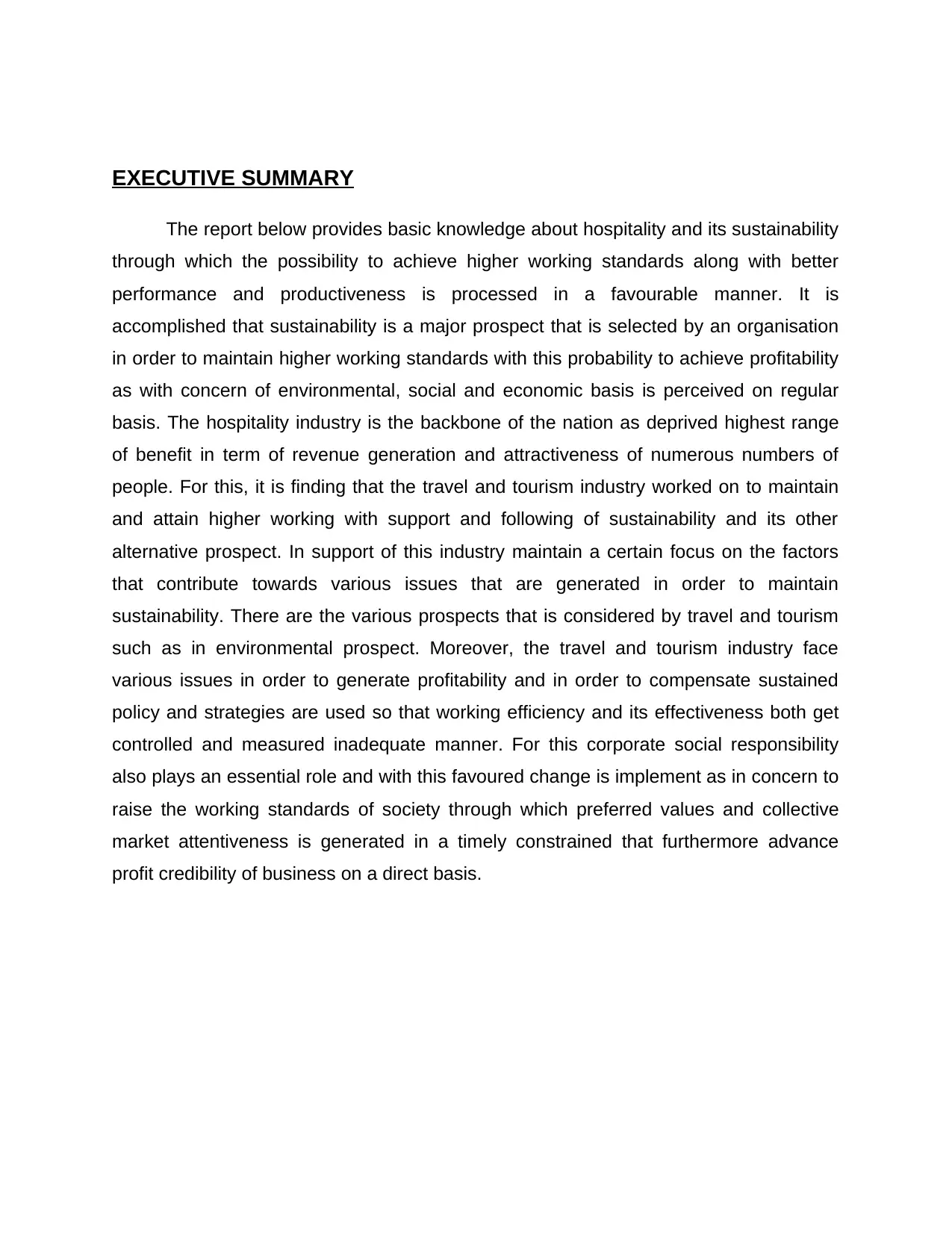
EXECUTIVE SUMMARY
The report below provides basic knowledge about hospitality and its sustainability
through which the possibility to achieve higher working standards along with better
performance and productiveness is processed in a favourable manner. It is
accomplished that sustainability is a major prospect that is selected by an organisation
in order to maintain higher working standards with this probability to achieve profitability
as with concern of environmental, social and economic basis is perceived on regular
basis. The hospitality industry is the backbone of the nation as deprived highest range
of benefit in term of revenue generation and attractiveness of numerous numbers of
people. For this, it is finding that the travel and tourism industry worked on to maintain
and attain higher working with support and following of sustainability and its other
alternative prospect. In support of this industry maintain a certain focus on the factors
that contribute towards various issues that are generated in order to maintain
sustainability. There are the various prospects that is considered by travel and tourism
such as in environmental prospect. Moreover, the travel and tourism industry face
various issues in order to generate profitability and in order to compensate sustained
policy and strategies are used so that working efficiency and its effectiveness both get
controlled and measured inadequate manner. For this corporate social responsibility
also plays an essential role and with this favoured change is implement as in concern to
raise the working standards of society through which preferred values and collective
market attentiveness is generated in a timely constrained that furthermore advance
profit credibility of business on a direct basis.
The report below provides basic knowledge about hospitality and its sustainability
through which the possibility to achieve higher working standards along with better
performance and productiveness is processed in a favourable manner. It is
accomplished that sustainability is a major prospect that is selected by an organisation
in order to maintain higher working standards with this probability to achieve profitability
as with concern of environmental, social and economic basis is perceived on regular
basis. The hospitality industry is the backbone of the nation as deprived highest range
of benefit in term of revenue generation and attractiveness of numerous numbers of
people. For this, it is finding that the travel and tourism industry worked on to maintain
and attain higher working with support and following of sustainability and its other
alternative prospect. In support of this industry maintain a certain focus on the factors
that contribute towards various issues that are generated in order to maintain
sustainability. There are the various prospects that is considered by travel and tourism
such as in environmental prospect. Moreover, the travel and tourism industry face
various issues in order to generate profitability and in order to compensate sustained
policy and strategies are used so that working efficiency and its effectiveness both get
controlled and measured inadequate manner. For this corporate social responsibility
also plays an essential role and with this favoured change is implement as in concern to
raise the working standards of society through which preferred values and collective
market attentiveness is generated in a timely constrained that furthermore advance
profit credibility of business on a direct basis.
Paraphrase This Document
Need a fresh take? Get an instant paraphrase of this document with our AI Paraphraser
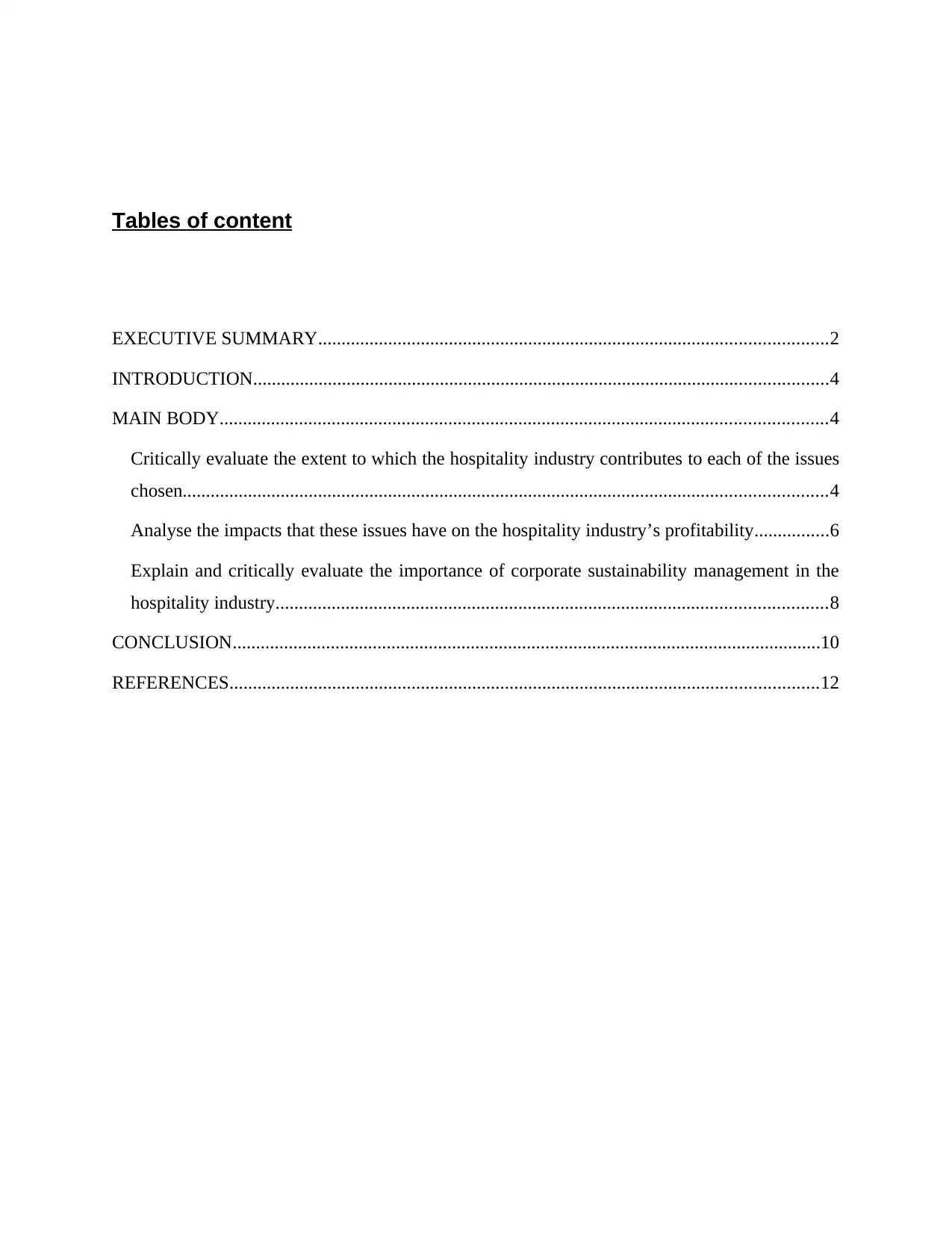
Tables of content
EXECUTIVE SUMMARY.............................................................................................................2
INTRODUCTION...........................................................................................................................4
MAIN BODY..................................................................................................................................4
Critically evaluate the extent to which the hospitality industry contributes to each of the issues
chosen..........................................................................................................................................4
Analyse the impacts that these issues have on the hospitality industry’s profitability................6
Explain and critically evaluate the importance of corporate sustainability management in the
hospitality industry......................................................................................................................8
CONCLUSION..............................................................................................................................10
REFERENCES..............................................................................................................................12
EXECUTIVE SUMMARY.............................................................................................................2
INTRODUCTION...........................................................................................................................4
MAIN BODY..................................................................................................................................4
Critically evaluate the extent to which the hospitality industry contributes to each of the issues
chosen..........................................................................................................................................4
Analyse the impacts that these issues have on the hospitality industry’s profitability................6
Explain and critically evaluate the importance of corporate sustainability management in the
hospitality industry......................................................................................................................8
CONCLUSION..............................................................................................................................10
REFERENCES..............................................................................................................................12
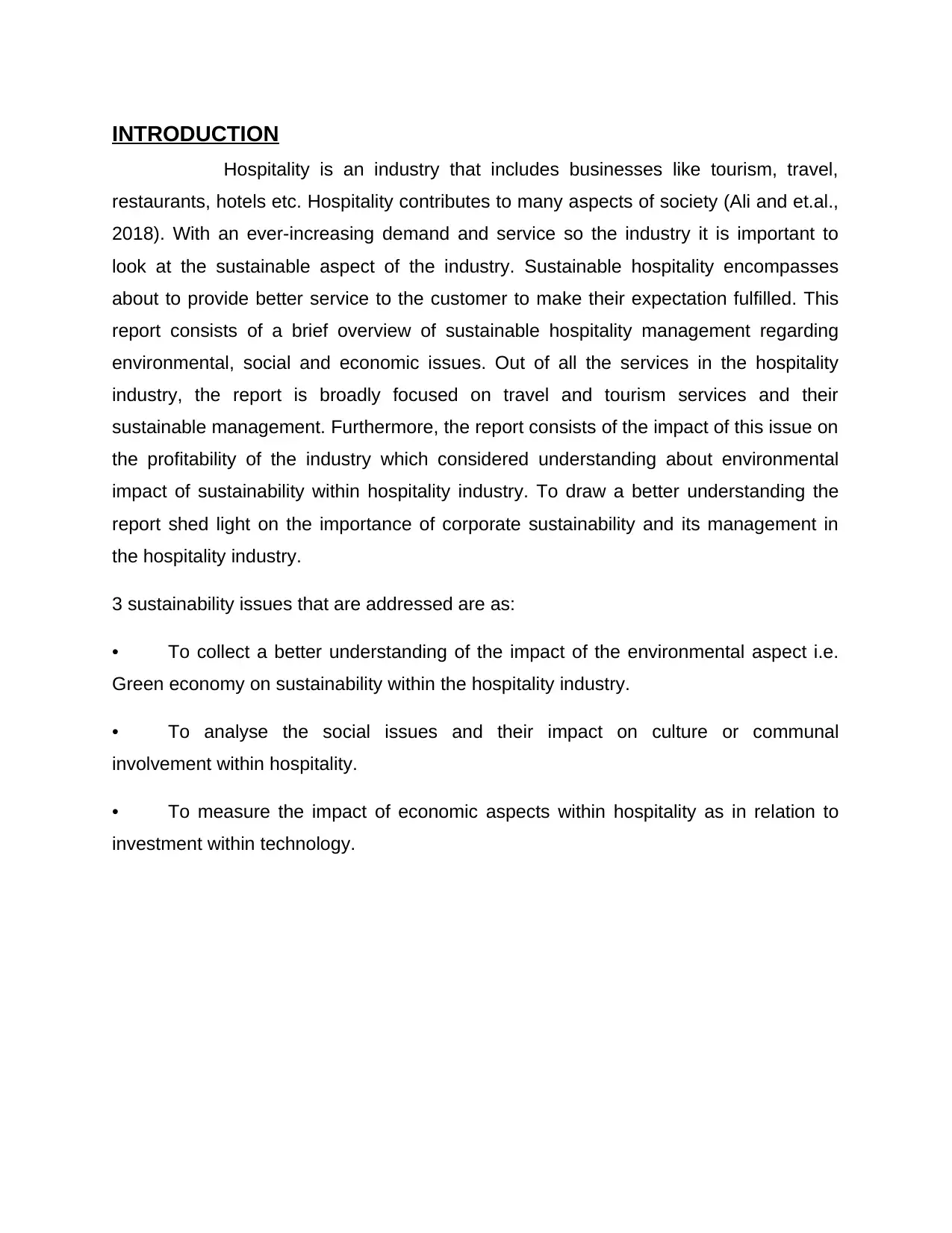
INTRODUCTION
Hospitality is an industry that includes businesses like tourism, travel,
restaurants, hotels etc. Hospitality contributes to many aspects of society (Ali and et.al.,
2018). With an ever-increasing demand and service so the industry it is important to
look at the sustainable aspect of the industry. Sustainable hospitality encompasses
about to provide better service to the customer to make their expectation fulfilled. This
report consists of a brief overview of sustainable hospitality management regarding
environmental, social and economic issues. Out of all the services in the hospitality
industry, the report is broadly focused on travel and tourism services and their
sustainable management. Furthermore, the report consists of the impact of this issue on
the profitability of the industry which considered understanding about environmental
impact of sustainability within hospitality industry. To draw a better understanding the
report shed light on the importance of corporate sustainability and its management in
the hospitality industry.
3 sustainability issues that are addressed are as:
• To collect a better understanding of the impact of the environmental aspect i.e.
Green economy on sustainability within the hospitality industry.
• To analyse the social issues and their impact on culture or communal
involvement within hospitality.
• To measure the impact of economic aspects within hospitality as in relation to
investment within technology.
Hospitality is an industry that includes businesses like tourism, travel,
restaurants, hotels etc. Hospitality contributes to many aspects of society (Ali and et.al.,
2018). With an ever-increasing demand and service so the industry it is important to
look at the sustainable aspect of the industry. Sustainable hospitality encompasses
about to provide better service to the customer to make their expectation fulfilled. This
report consists of a brief overview of sustainable hospitality management regarding
environmental, social and economic issues. Out of all the services in the hospitality
industry, the report is broadly focused on travel and tourism services and their
sustainable management. Furthermore, the report consists of the impact of this issue on
the profitability of the industry which considered understanding about environmental
impact of sustainability within hospitality industry. To draw a better understanding the
report shed light on the importance of corporate sustainability and its management in
the hospitality industry.
3 sustainability issues that are addressed are as:
• To collect a better understanding of the impact of the environmental aspect i.e.
Green economy on sustainability within the hospitality industry.
• To analyse the social issues and their impact on culture or communal
involvement within hospitality.
• To measure the impact of economic aspects within hospitality as in relation to
investment within technology.
⊘ This is a preview!⊘
Do you want full access?
Subscribe today to unlock all pages.

Trusted by 1+ million students worldwide
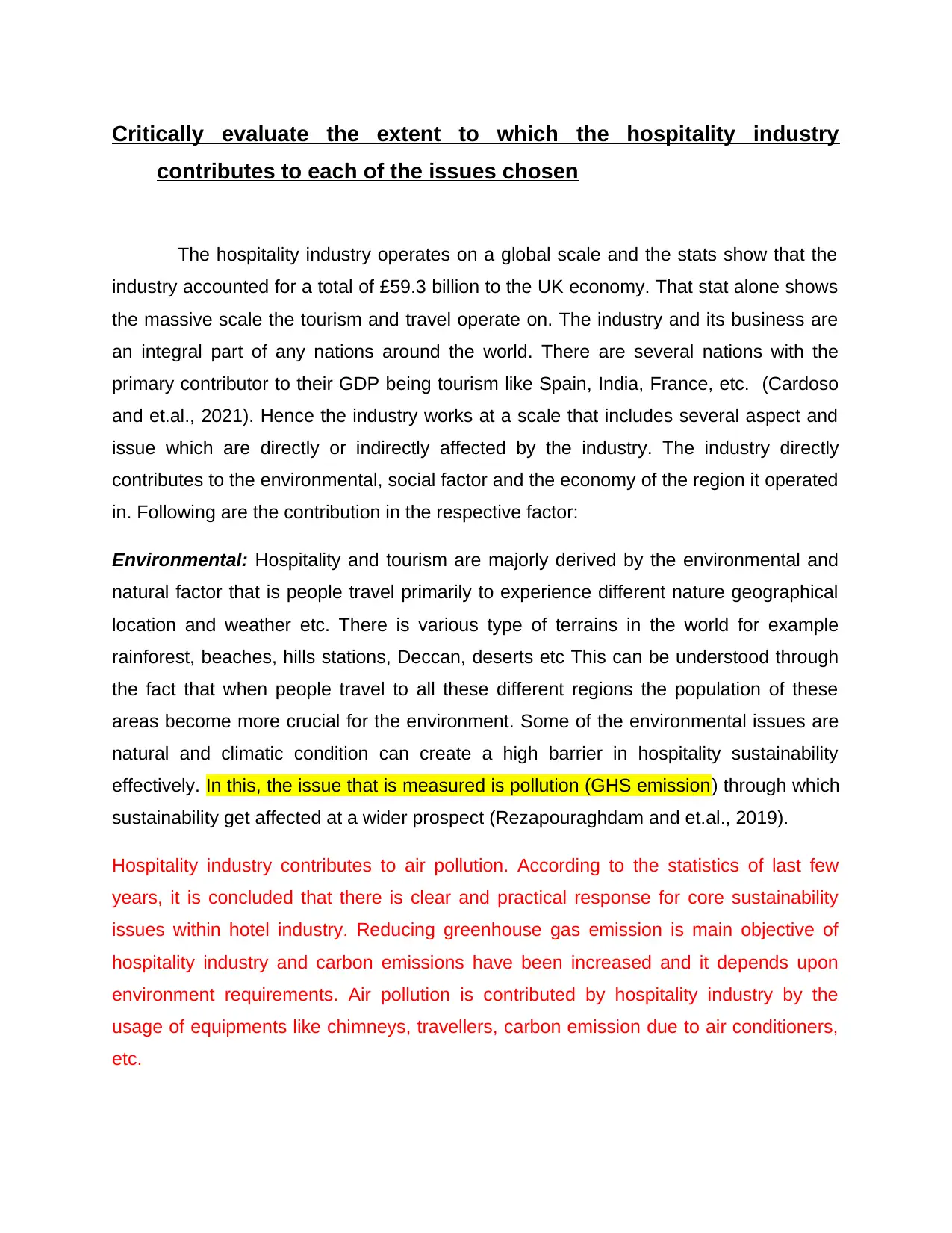
Critically evaluate the extent to which the hospitality industry
contributes to each of the issues chosen
The hospitality industry operates on a global scale and the stats show that the
industry accounted for a total of £59.3 billion to the UK economy. That stat alone shows
the massive scale the tourism and travel operate on. The industry and its business are
an integral part of any nations around the world. There are several nations with the
primary contributor to their GDP being tourism like Spain, India, France, etc. (Cardoso
and et.al., 2021). Hence the industry works at a scale that includes several aspect and
issue which are directly or indirectly affected by the industry. The industry directly
contributes to the environmental, social factor and the economy of the region it operated
in. Following are the contribution in the respective factor:
Environmental: Hospitality and tourism are majorly derived by the environmental and
natural factor that is people travel primarily to experience different nature geographical
location and weather etc. There is various type of terrains in the world for example
rainforest, beaches, hills stations, Deccan, deserts etc This can be understood through
the fact that when people travel to all these different regions the population of these
areas become more crucial for the environment. Some of the environmental issues are
natural and climatic condition can create a high barrier in hospitality sustainability
effectively. In this, the issue that is measured is pollution (GHS emission) through which
sustainability get affected at a wider prospect (Rezapouraghdam and et.al., 2019).
Hospitality industry contributes to air pollution. According to the statistics of last few
years, it is concluded that there is clear and practical response for core sustainability
issues within hotel industry. Reducing greenhouse gas emission is main objective of
hospitality industry and carbon emissions have been increased and it depends upon
environment requirements. Air pollution is contributed by hospitality industry by the
usage of equipments like chimneys, travellers, carbon emission due to air conditioners,
etc.
contributes to each of the issues chosen
The hospitality industry operates on a global scale and the stats show that the
industry accounted for a total of £59.3 billion to the UK economy. That stat alone shows
the massive scale the tourism and travel operate on. The industry and its business are
an integral part of any nations around the world. There are several nations with the
primary contributor to their GDP being tourism like Spain, India, France, etc. (Cardoso
and et.al., 2021). Hence the industry works at a scale that includes several aspect and
issue which are directly or indirectly affected by the industry. The industry directly
contributes to the environmental, social factor and the economy of the region it operated
in. Following are the contribution in the respective factor:
Environmental: Hospitality and tourism are majorly derived by the environmental and
natural factor that is people travel primarily to experience different nature geographical
location and weather etc. There is various type of terrains in the world for example
rainforest, beaches, hills stations, Deccan, deserts etc This can be understood through
the fact that when people travel to all these different regions the population of these
areas become more crucial for the environment. Some of the environmental issues are
natural and climatic condition can create a high barrier in hospitality sustainability
effectively. In this, the issue that is measured is pollution (GHS emission) through which
sustainability get affected at a wider prospect (Rezapouraghdam and et.al., 2019).
Hospitality industry contributes to air pollution. According to the statistics of last few
years, it is concluded that there is clear and practical response for core sustainability
issues within hotel industry. Reducing greenhouse gas emission is main objective of
hospitality industry and carbon emissions have been increased and it depends upon
environment requirements. Air pollution is contributed by hospitality industry by the
usage of equipments like chimneys, travellers, carbon emission due to air conditioners,
etc.
Paraphrase This Document
Need a fresh take? Get an instant paraphrase of this document with our AI Paraphraser
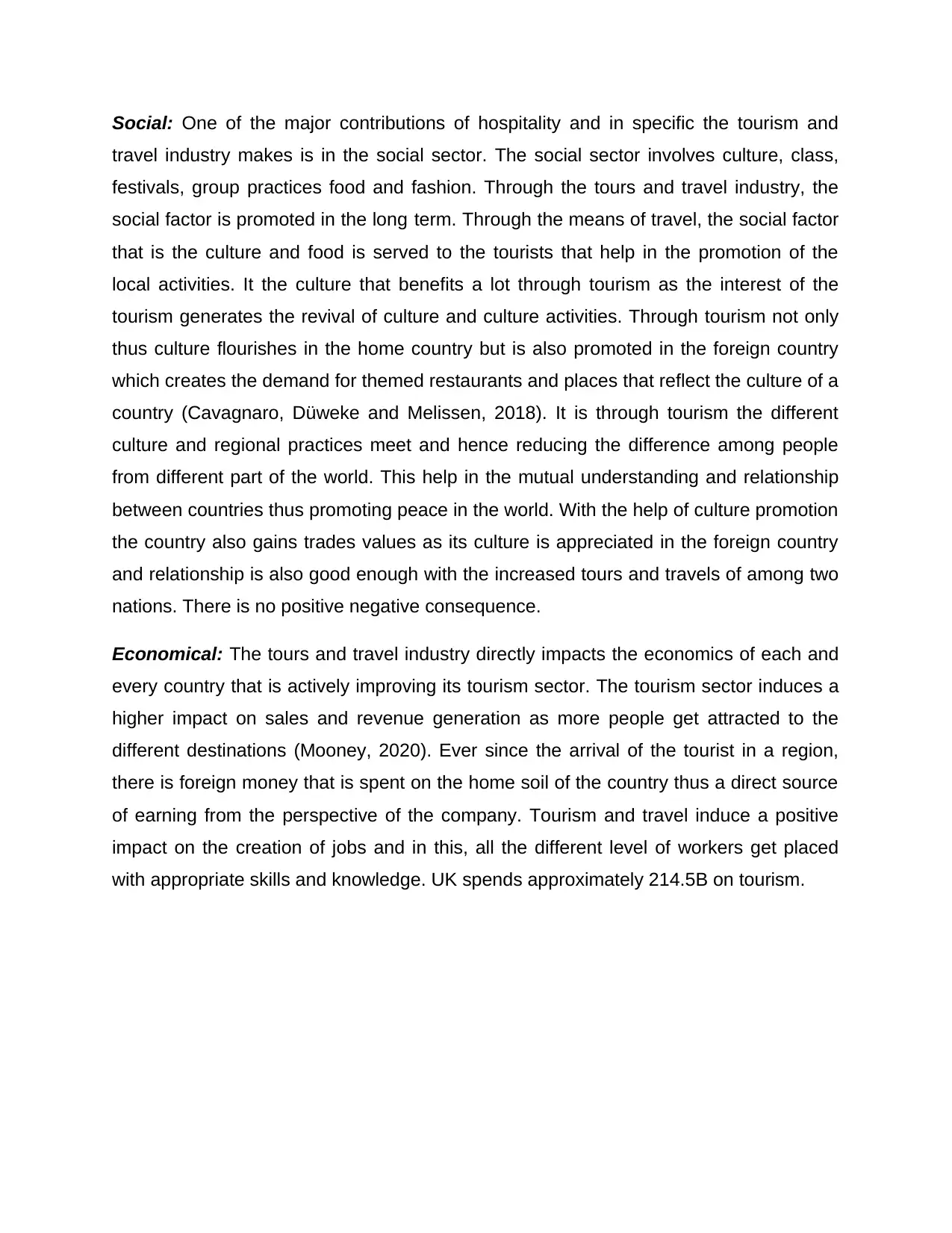
Social: One of the major contributions of hospitality and in specific the tourism and
travel industry makes is in the social sector. The social sector involves culture, class,
festivals, group practices food and fashion. Through the tours and travel industry, the
social factor is promoted in the long term. Through the means of travel, the social factor
that is the culture and food is served to the tourists that help in the promotion of the
local activities. It the culture that benefits a lot through tourism as the interest of the
tourism generates the revival of culture and culture activities. Through tourism not only
thus culture flourishes in the home country but is also promoted in the foreign country
which creates the demand for themed restaurants and places that reflect the culture of a
country (Cavagnaro, Düweke and Melissen, 2018). It is through tourism the different
culture and regional practices meet and hence reducing the difference among people
from different part of the world. This help in the mutual understanding and relationship
between countries thus promoting peace in the world. With the help of culture promotion
the country also gains trades values as its culture is appreciated in the foreign country
and relationship is also good enough with the increased tours and travels of among two
nations. There is no positive negative consequence.
Economical: The tours and travel industry directly impacts the economics of each and
every country that is actively improving its tourism sector. The tourism sector induces a
higher impact on sales and revenue generation as more people get attracted to the
different destinations (Mooney, 2020). Ever since the arrival of the tourist in a region,
there is foreign money that is spent on the home soil of the country thus a direct source
of earning from the perspective of the company. Tourism and travel induce a positive
impact on the creation of jobs and in this, all the different level of workers get placed
with appropriate skills and knowledge. UK spends approximately 214.5B on tourism.
travel industry makes is in the social sector. The social sector involves culture, class,
festivals, group practices food and fashion. Through the tours and travel industry, the
social factor is promoted in the long term. Through the means of travel, the social factor
that is the culture and food is served to the tourists that help in the promotion of the
local activities. It the culture that benefits a lot through tourism as the interest of the
tourism generates the revival of culture and culture activities. Through tourism not only
thus culture flourishes in the home country but is also promoted in the foreign country
which creates the demand for themed restaurants and places that reflect the culture of a
country (Cavagnaro, Düweke and Melissen, 2018). It is through tourism the different
culture and regional practices meet and hence reducing the difference among people
from different part of the world. This help in the mutual understanding and relationship
between countries thus promoting peace in the world. With the help of culture promotion
the country also gains trades values as its culture is appreciated in the foreign country
and relationship is also good enough with the increased tours and travels of among two
nations. There is no positive negative consequence.
Economical: The tours and travel industry directly impacts the economics of each and
every country that is actively improving its tourism sector. The tourism sector induces a
higher impact on sales and revenue generation as more people get attracted to the
different destinations (Mooney, 2020). Ever since the arrival of the tourist in a region,
there is foreign money that is spent on the home soil of the country thus a direct source
of earning from the perspective of the company. Tourism and travel induce a positive
impact on the creation of jobs and in this, all the different level of workers get placed
with appropriate skills and knowledge. UK spends approximately 214.5B on tourism.
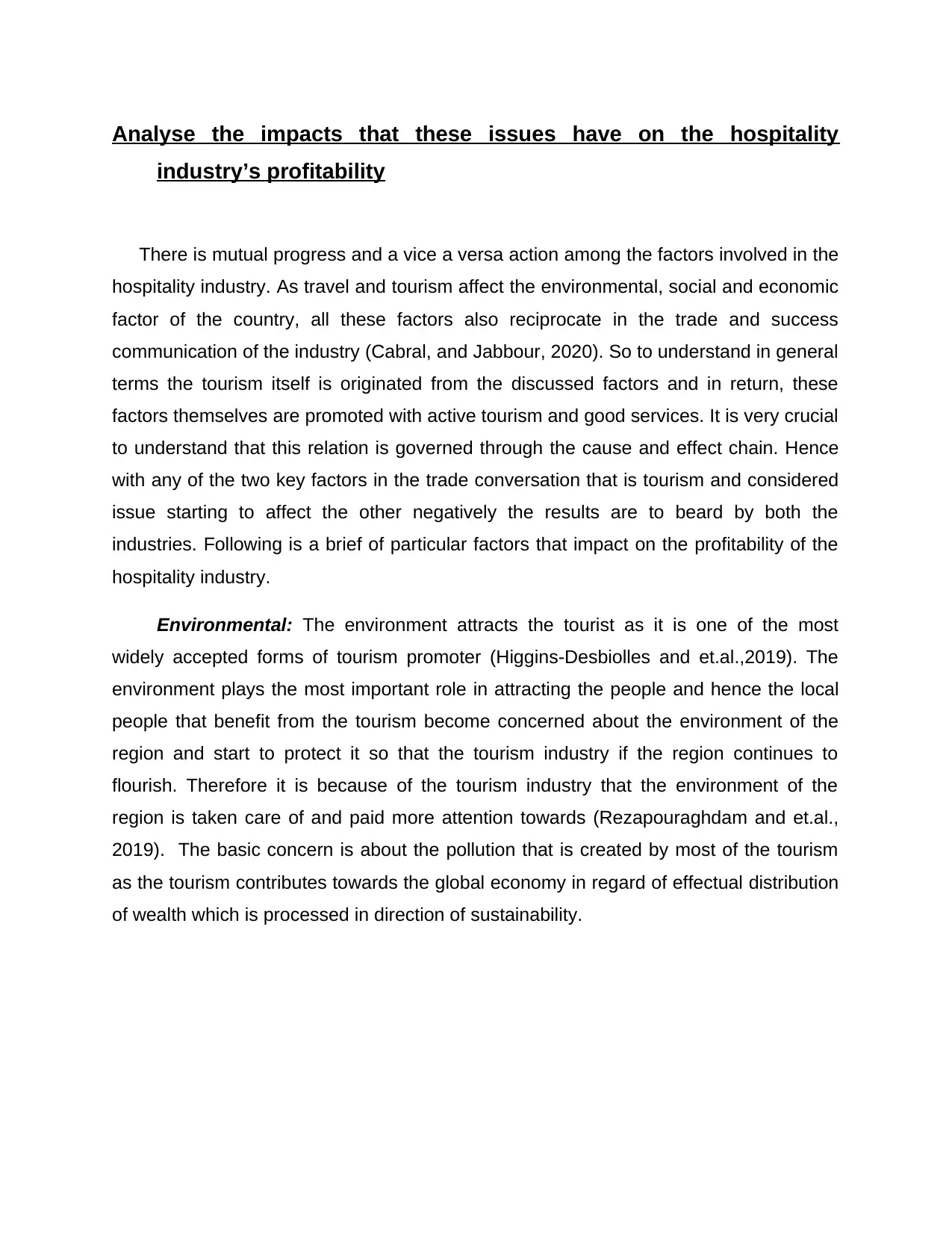
Analyse the impacts that these issues have on the hospitality
industry’s profitability
There is mutual progress and a vice a versa action among the factors involved in the
hospitality industry. As travel and tourism affect the environmental, social and economic
factor of the country, all these factors also reciprocate in the trade and success
communication of the industry (Cabral, and Jabbour, 2020). So to understand in general
terms the tourism itself is originated from the discussed factors and in return, these
factors themselves are promoted with active tourism and good services. It is very crucial
to understand that this relation is governed through the cause and effect chain. Hence
with any of the two key factors in the trade conversation that is tourism and considered
issue starting to affect the other negatively the results are to beard by both the
industries. Following is a brief of particular factors that impact on the profitability of the
hospitality industry.
Environmental: The environment attracts the tourist as it is one of the most
widely accepted forms of tourism promoter (Higgins-Desbiolles and et.al.,2019). The
environment plays the most important role in attracting the people and hence the local
people that benefit from the tourism become concerned about the environment of the
region and start to protect it so that the tourism industry if the region continues to
flourish. Therefore it is because of the tourism industry that the environment of the
region is taken care of and paid more attention towards (Rezapouraghdam and et.al.,
2019). The basic concern is about the pollution that is created by most of the tourism
as the tourism contributes towards the global economy in regard of effectual distribution
of wealth which is processed in direction of sustainability.
industry’s profitability
There is mutual progress and a vice a versa action among the factors involved in the
hospitality industry. As travel and tourism affect the environmental, social and economic
factor of the country, all these factors also reciprocate in the trade and success
communication of the industry (Cabral, and Jabbour, 2020). So to understand in general
terms the tourism itself is originated from the discussed factors and in return, these
factors themselves are promoted with active tourism and good services. It is very crucial
to understand that this relation is governed through the cause and effect chain. Hence
with any of the two key factors in the trade conversation that is tourism and considered
issue starting to affect the other negatively the results are to beard by both the
industries. Following is a brief of particular factors that impact on the profitability of the
hospitality industry.
Environmental: The environment attracts the tourist as it is one of the most
widely accepted forms of tourism promoter (Higgins-Desbiolles and et.al.,2019). The
environment plays the most important role in attracting the people and hence the local
people that benefit from the tourism become concerned about the environment of the
region and start to protect it so that the tourism industry if the region continues to
flourish. Therefore it is because of the tourism industry that the environment of the
region is taken care of and paid more attention towards (Rezapouraghdam and et.al.,
2019). The basic concern is about the pollution that is created by most of the tourism
as the tourism contributes towards the global economy in regard of effectual distribution
of wealth which is processed in direction of sustainability.
⊘ This is a preview!⊘
Do you want full access?
Subscribe today to unlock all pages.

Trusted by 1+ million students worldwide
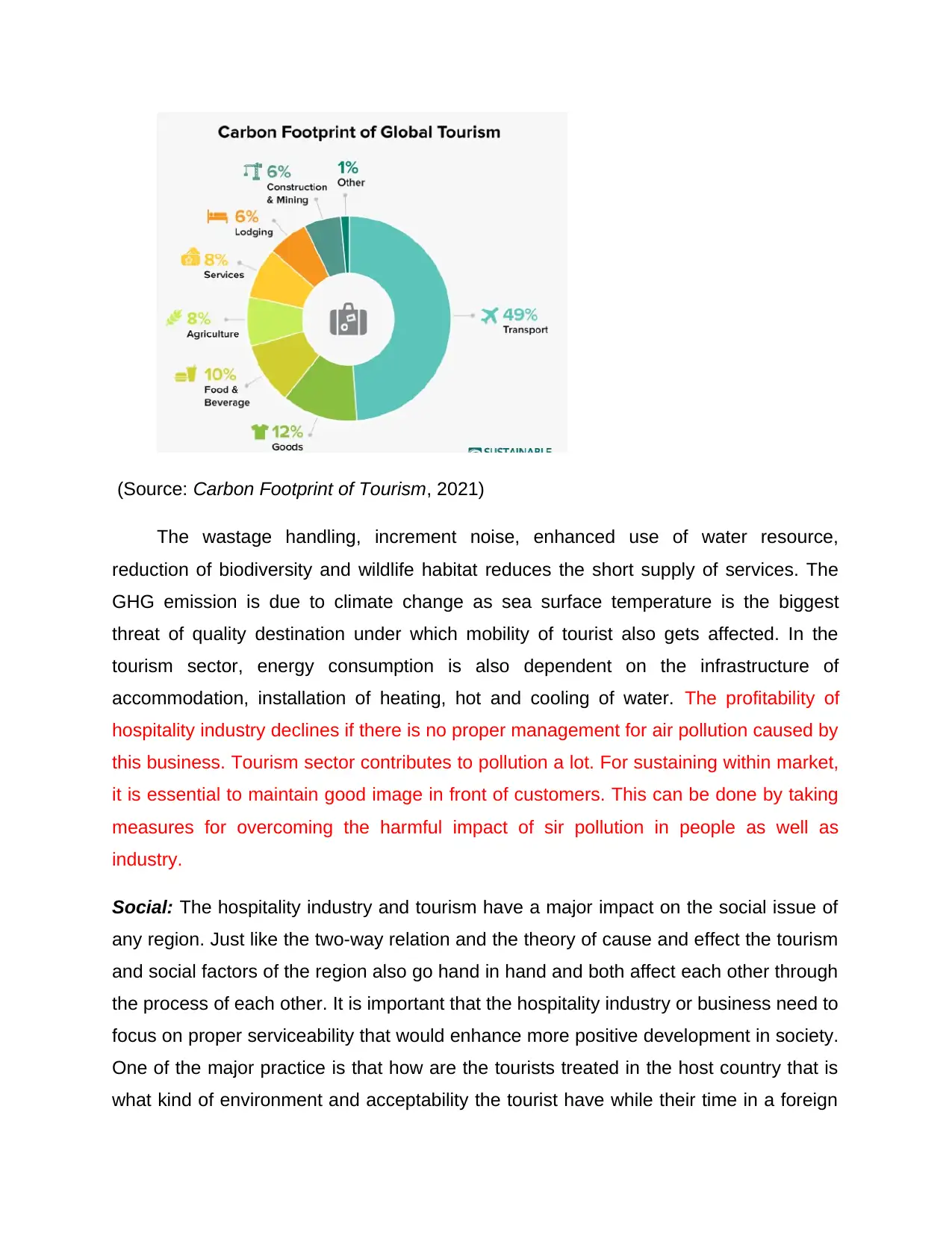
(Source: Carbon Footprint of Tourism, 2021)
The wastage handling, increment noise, enhanced use of water resource,
reduction of biodiversity and wildlife habitat reduces the short supply of services. The
GHG emission is due to climate change as sea surface temperature is the biggest
threat of quality destination under which mobility of tourist also gets affected. In the
tourism sector, energy consumption is also dependent on the infrastructure of
accommodation, installation of heating, hot and cooling of water. The profitability of
hospitality industry declines if there is no proper management for air pollution caused by
this business. Tourism sector contributes to pollution a lot. For sustaining within market,
it is essential to maintain good image in front of customers. This can be done by taking
measures for overcoming the harmful impact of sir pollution in people as well as
industry.
Social: The hospitality industry and tourism have a major impact on the social issue of
any region. Just like the two-way relation and the theory of cause and effect the tourism
and social factors of the region also go hand in hand and both affect each other through
the process of each other. It is important that the hospitality industry or business need to
focus on proper serviceability that would enhance more positive development in society.
One of the major practice is that how are the tourists treated in the host country that is
what kind of environment and acceptability the tourist have while their time in a foreign
The wastage handling, increment noise, enhanced use of water resource,
reduction of biodiversity and wildlife habitat reduces the short supply of services. The
GHG emission is due to climate change as sea surface temperature is the biggest
threat of quality destination under which mobility of tourist also gets affected. In the
tourism sector, energy consumption is also dependent on the infrastructure of
accommodation, installation of heating, hot and cooling of water. The profitability of
hospitality industry declines if there is no proper management for air pollution caused by
this business. Tourism sector contributes to pollution a lot. For sustaining within market,
it is essential to maintain good image in front of customers. This can be done by taking
measures for overcoming the harmful impact of sir pollution in people as well as
industry.
Social: The hospitality industry and tourism have a major impact on the social issue of
any region. Just like the two-way relation and the theory of cause and effect the tourism
and social factors of the region also go hand in hand and both affect each other through
the process of each other. It is important that the hospitality industry or business need to
focus on proper serviceability that would enhance more positive development in society.
One of the major practice is that how are the tourists treated in the host country that is
what kind of environment and acceptability the tourist have while their time in a foreign
Paraphrase This Document
Need a fresh take? Get an instant paraphrase of this document with our AI Paraphraser
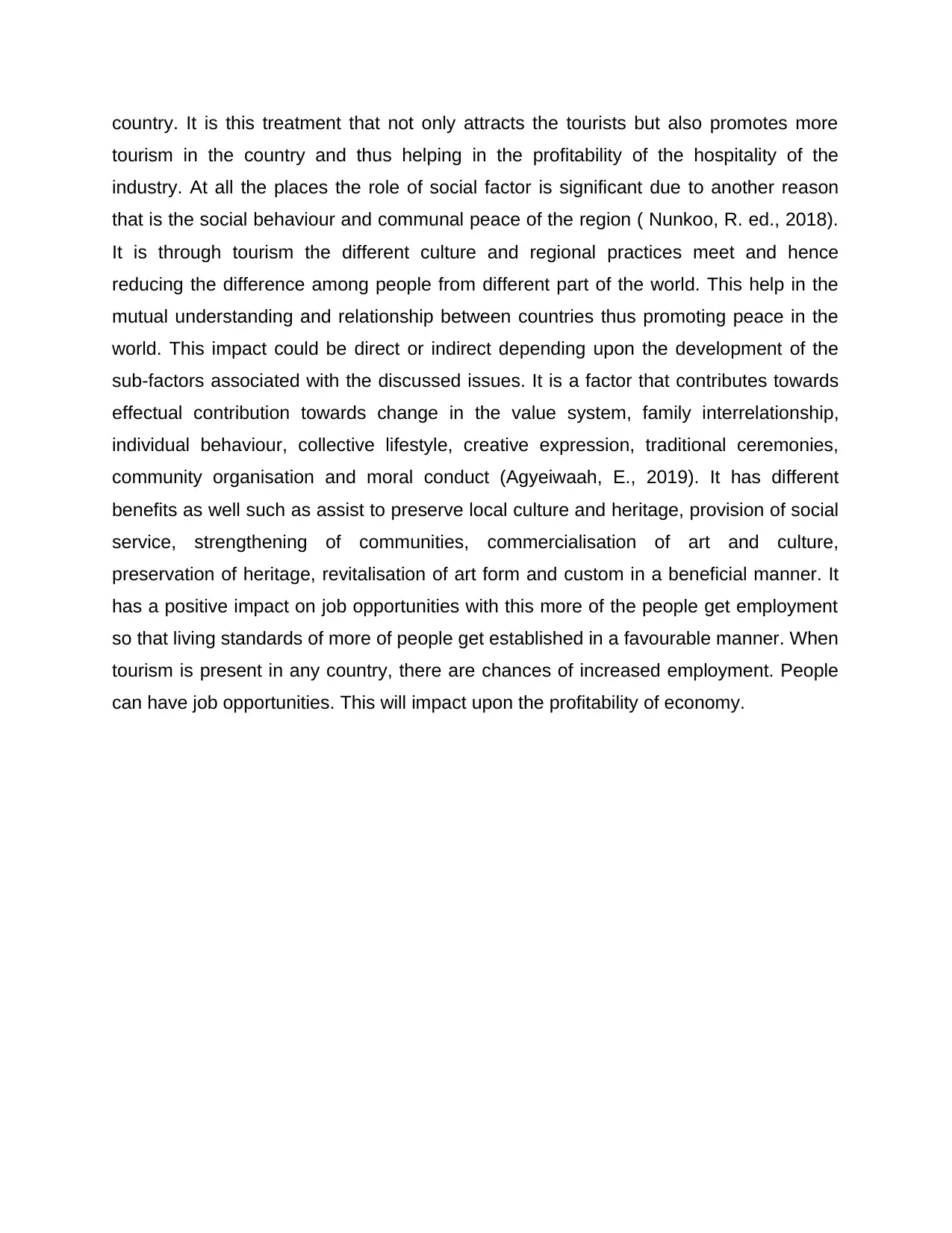
country. It is this treatment that not only attracts the tourists but also promotes more
tourism in the country and thus helping in the profitability of the hospitality of the
industry. At all the places the role of social factor is significant due to another reason
that is the social behaviour and communal peace of the region ( Nunkoo, R. ed., 2018).
It is through tourism the different culture and regional practices meet and hence
reducing the difference among people from different part of the world. This help in the
mutual understanding and relationship between countries thus promoting peace in the
world. This impact could be direct or indirect depending upon the development of the
sub-factors associated with the discussed issues. It is a factor that contributes towards
effectual contribution towards change in the value system, family interrelationship,
individual behaviour, collective lifestyle, creative expression, traditional ceremonies,
community organisation and moral conduct (Agyeiwaah, E., 2019). It has different
benefits as well such as assist to preserve local culture and heritage, provision of social
service, strengthening of communities, commercialisation of art and culture,
preservation of heritage, revitalisation of art form and custom in a beneficial manner. It
has a positive impact on job opportunities with this more of the people get employment
so that living standards of more of people get established in a favourable manner. When
tourism is present in any country, there are chances of increased employment. People
can have job opportunities. This will impact upon the profitability of economy.
tourism in the country and thus helping in the profitability of the hospitality of the
industry. At all the places the role of social factor is significant due to another reason
that is the social behaviour and communal peace of the region ( Nunkoo, R. ed., 2018).
It is through tourism the different culture and regional practices meet and hence
reducing the difference among people from different part of the world. This help in the
mutual understanding and relationship between countries thus promoting peace in the
world. This impact could be direct or indirect depending upon the development of the
sub-factors associated with the discussed issues. It is a factor that contributes towards
effectual contribution towards change in the value system, family interrelationship,
individual behaviour, collective lifestyle, creative expression, traditional ceremonies,
community organisation and moral conduct (Agyeiwaah, E., 2019). It has different
benefits as well such as assist to preserve local culture and heritage, provision of social
service, strengthening of communities, commercialisation of art and culture,
preservation of heritage, revitalisation of art form and custom in a beneficial manner. It
has a positive impact on job opportunities with this more of the people get employment
so that living standards of more of people get established in a favourable manner. When
tourism is present in any country, there are chances of increased employment. People
can have job opportunities. This will impact upon the profitability of economy.
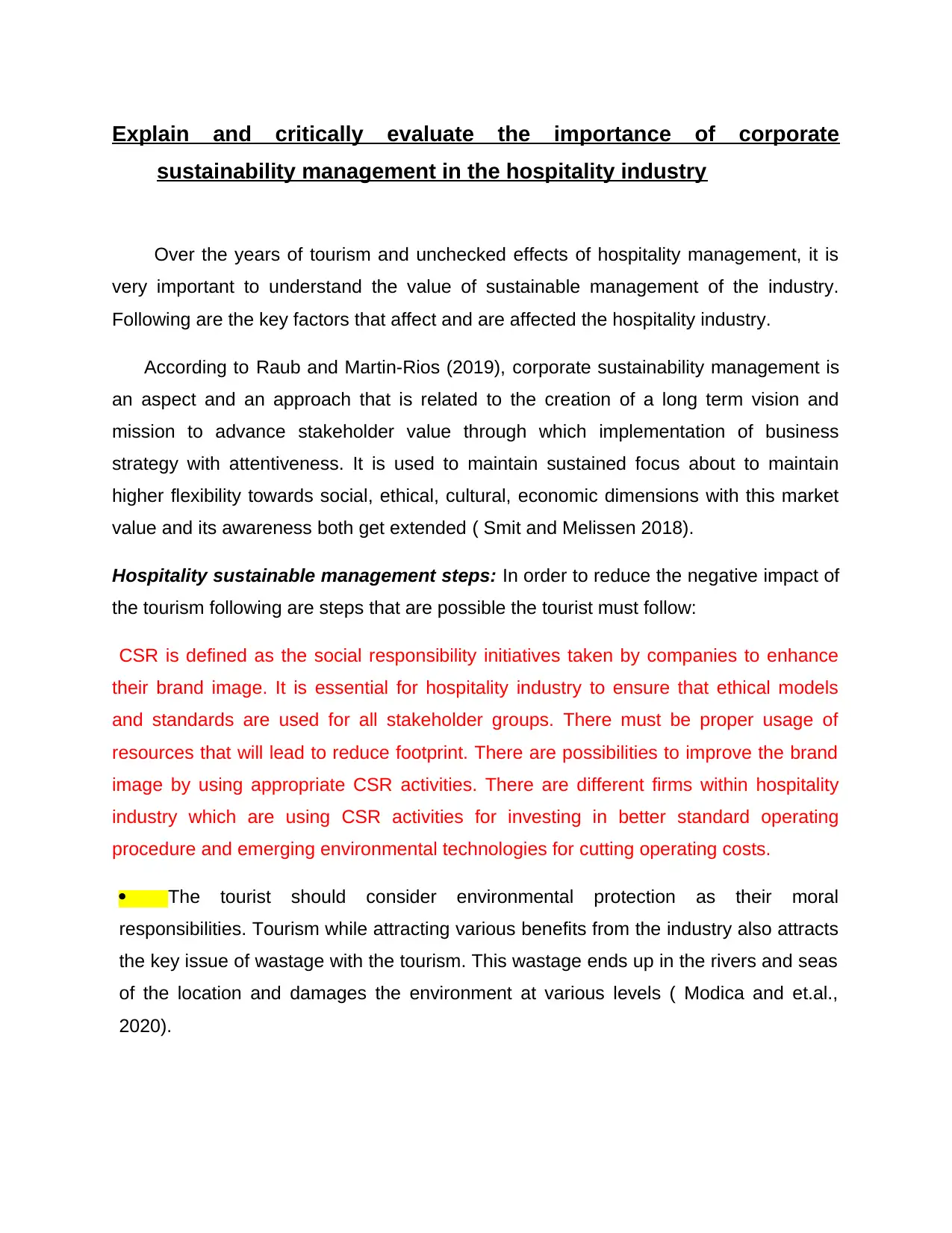
Explain and critically evaluate the importance of corporate
sustainability management in the hospitality industry
Over the years of tourism and unchecked effects of hospitality management, it is
very important to understand the value of sustainable management of the industry.
Following are the key factors that affect and are affected the hospitality industry.
According to Raub and Martin-Rios (2019), corporate sustainability management is
an aspect and an approach that is related to the creation of a long term vision and
mission to advance stakeholder value through which implementation of business
strategy with attentiveness. It is used to maintain sustained focus about to maintain
higher flexibility towards social, ethical, cultural, economic dimensions with this market
value and its awareness both get extended ( Smit and Melissen 2018).
Hospitality sustainable management steps: In order to reduce the negative impact of
the tourism following are steps that are possible the tourist must follow:
CSR is defined as the social responsibility initiatives taken by companies to enhance
their brand image. It is essential for hospitality industry to ensure that ethical models
and standards are used for all stakeholder groups. There must be proper usage of
resources that will lead to reduce footprint. There are possibilities to improve the brand
image by using appropriate CSR activities. There are different firms within hospitality
industry which are using CSR activities for investing in better standard operating
procedure and emerging environmental technologies for cutting operating costs.
The tourist should consider environmental protection as their moral
responsibilities. Tourism while attracting various benefits from the industry also attracts
the key issue of wastage with the tourism. This wastage ends up in the rivers and seas
of the location and damages the environment at various levels ( Modica and et.al.,
2020).
sustainability management in the hospitality industry
Over the years of tourism and unchecked effects of hospitality management, it is
very important to understand the value of sustainable management of the industry.
Following are the key factors that affect and are affected the hospitality industry.
According to Raub and Martin-Rios (2019), corporate sustainability management is
an aspect and an approach that is related to the creation of a long term vision and
mission to advance stakeholder value through which implementation of business
strategy with attentiveness. It is used to maintain sustained focus about to maintain
higher flexibility towards social, ethical, cultural, economic dimensions with this market
value and its awareness both get extended ( Smit and Melissen 2018).
Hospitality sustainable management steps: In order to reduce the negative impact of
the tourism following are steps that are possible the tourist must follow:
CSR is defined as the social responsibility initiatives taken by companies to enhance
their brand image. It is essential for hospitality industry to ensure that ethical models
and standards are used for all stakeholder groups. There must be proper usage of
resources that will lead to reduce footprint. There are possibilities to improve the brand
image by using appropriate CSR activities. There are different firms within hospitality
industry which are using CSR activities for investing in better standard operating
procedure and emerging environmental technologies for cutting operating costs.
The tourist should consider environmental protection as their moral
responsibilities. Tourism while attracting various benefits from the industry also attracts
the key issue of wastage with the tourism. This wastage ends up in the rivers and seas
of the location and damages the environment at various levels ( Modica and et.al.,
2020).
⊘ This is a preview!⊘
Do you want full access?
Subscribe today to unlock all pages.

Trusted by 1+ million students worldwide
1 out of 17
Related Documents
Your All-in-One AI-Powered Toolkit for Academic Success.
+13062052269
info@desklib.com
Available 24*7 on WhatsApp / Email
![[object Object]](/_next/static/media/star-bottom.7253800d.svg)
Unlock your academic potential
Copyright © 2020–2025 A2Z Services. All Rights Reserved. Developed and managed by ZUCOL.





